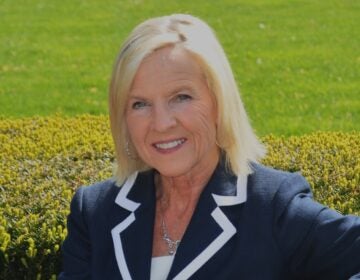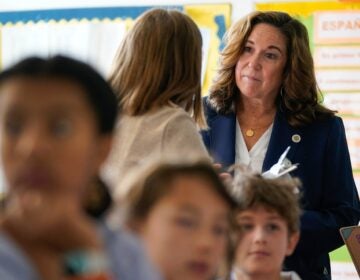‘It’s tough’: Delaware Treasurer Colleen Davis shares health journey after testing positive for cancer-causing gene mutation
Davis was running for Delaware’s lone congressional seat when she discovered her family’s history included an unknown genetic condition.
Listen 3:56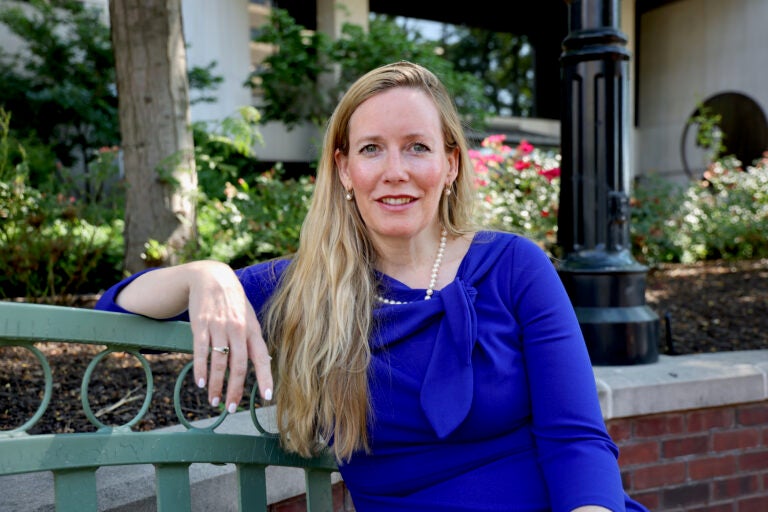
Delaware State Treasurer Colleen Davis in the courtyard outside her Wilmington office. (Emma Lee/WHYY)
This story was supported by a statehouse coverage grant from the Corporation for Public Broadcasting.
Delaware Treasurer Colleen Davis was running for Congress until a cancer scare in her family prompted her to take a step back and re-examine her priorities.
Nearly a year ago, Davis had a busy schedule as Delaware’s state treasurer and a candidate for the state’s lone congressional seat. She was also caring for her sick father.
Davis was watching her dad’s prostate cancer grow worse. It had spread to his bones and he was not responding well to treatment. Davis said she suspected her family history included a possible genetic condition after learning an aunt had died in the 1970s of ovarian cancer while in her 30s. That’s when she asked her father’s doctors to test for a mutation of the breast cancer genes — called BRCA.
BRCA1 or BRCA2 genes suppress tumors. Those with inherited damaged or mutated BRCA genes have a higher chance of developing breast, ovarian and prostate cancer.
“We kind of had to push for it,” Davis said. “We had to say this was a real link and it may warrant getting that genetic testing.”
Davis’ hunch was confirmed when her father’s test returned positive. According to Johns Hopkins Medicine, having the mutation means you have a 45% to 85% increased likelihood of developing breast cancer and a 10% to 46% chance of getting ovarian cancer. In the general U.S. population, the probability of breast cancer is about 12%, with ovarian cancer affecting less than 1% of the population.
Kendra Flores, a genetic counselor with Christiana Health Systems, said the gene mutation is serious but rare, with fewer than 1 in 500 people carrying it.
“It is something that can sort of hide in families if you don’t know the things that you’re looking for,” she said.
Davis was tested and learned she also inherited the BRCA gene mutation. A healthy Davis suddenly faced a dramatically greater risk of developing cancer. She was particularly worried about her increased risk of developing ovarian cancer because of the limited ability of screening tests to detect it. The state treasurer’s background is in the health care industry, where she worked as a physician assistant for several years, starting in 2003.
“If I still was thinking about having more children or something like that, I might have held off,” she said. “But it was enough to say the risk is there.”
Women have two options for proactive treatment: frequent screenings or surgery. Davis chose to remove her ovaries and have a double mastectomy — the surgical removal of both breasts — earlier this year.
She said that concerns for her own health and her family’s changed her career priorities, forcing her to end her congressional campaign in February. Her dad passed away in March.
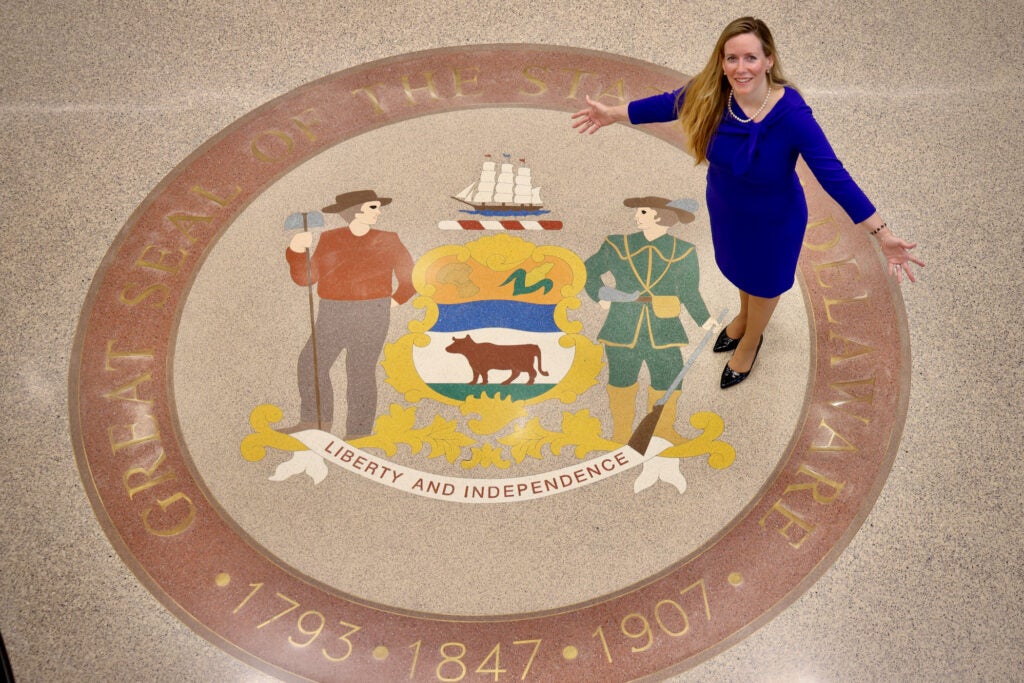
“I stepped out of the race because I really wanted to be there for my family, as my father was passing,” she said. “For me, it was really, really important to make that decision, even now. Just the other day we were at my mom’s house, clearing things out and doing things like that. So I still feel very strongly that I need to be there for her in this transition time.”
Davis has seven brothers and sisters. She said some have decided to get tested, while others have not.
Davis said that the surgeries reassured her about the possibility of developing cancer. But she said she had to learn to be comfortable with the changes surgery caused to her body on the outside and on the inside, such as entering menopause early.
“You know, you put on a dress and it doesn’t look the same as it did before surgery,” she said. “Little things like that. It’s definitely tough.”
Stephanie Caterson, the director of reconstructive plastic surgery at ChristianaCare, helped Davis with how she wanted to look after her double mastectomy
“Patients who are coming to me with a gene mutation, they’re really thinking a lot about the long-term results,” she said. “So we expect they will have a nice, long life to live and we want them to be looking the way that they want to look throughout those years.”
Flores said knowing your family’s history is important when considering genetic testing. Red flags include relatives with ovarian cancer, female relatives with breast cancer before 50 years of age, cancer in both breasts and male relatives with breast cancer.
“Ask those hard questions,” she said. “Use family holidays as an opportunity to ask the tough questions. When did grandma pass away? What was that cancer? Where did it start?
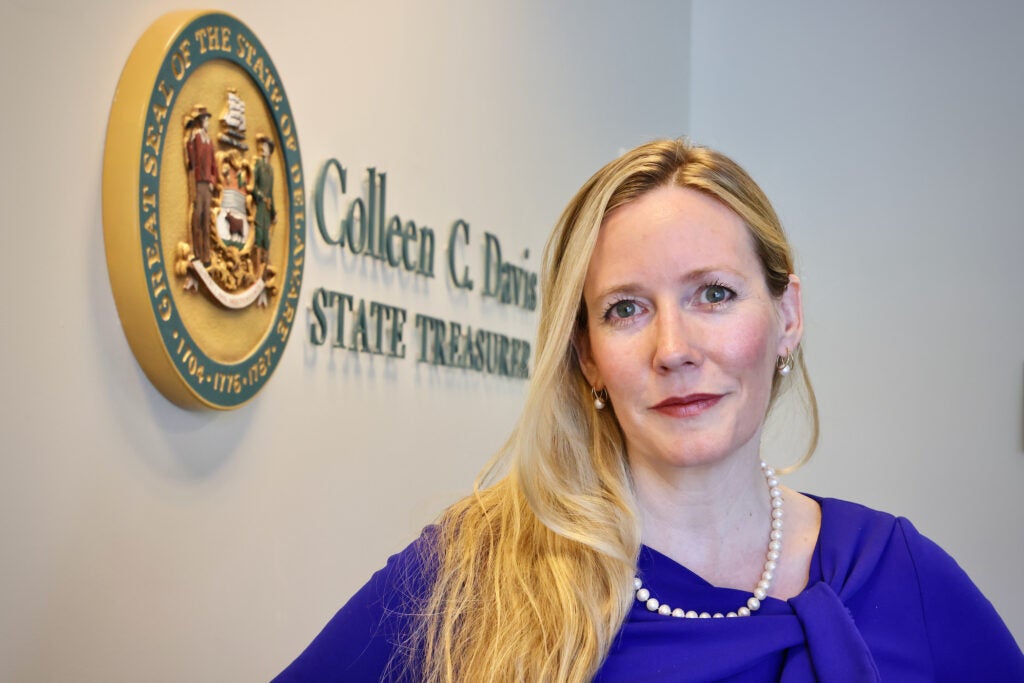
Davis says learning about the gene mutation empowered her to preemptively reduce her cancer risk. She hopes that her story helps other families facing the same difficult decisions.
“I think that getting more information out there is really helpful,” she said. “Knowing that it’s a bumpy road is also helpful, and that’s also why I want people to feel empowered, to be able to say, ‘OK, look, it’s going to be a bumpy road. I’m going to work directly with my clinician to say this is working, or this isn’t working, or how long should I expect it to be this bumpy and,’ and keep that dialogue going.”
Davis is in her second term as treasurer. She said she hasn’t ruled out pursuing future career opportunities.
“I’m so grateful to be able to do this work,” she said. “I’m really grateful to be able to be part of something so much bigger here in Delaware, and for all those reasons I know that there’s something else down the road. It’s just not today.”

Get daily updates from WHYY News!
WHYY is your source for fact-based, in-depth journalism and information. As a nonprofit organization, we rely on financial support from readers like you. Please give today.




